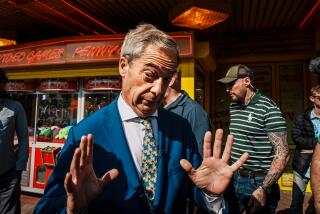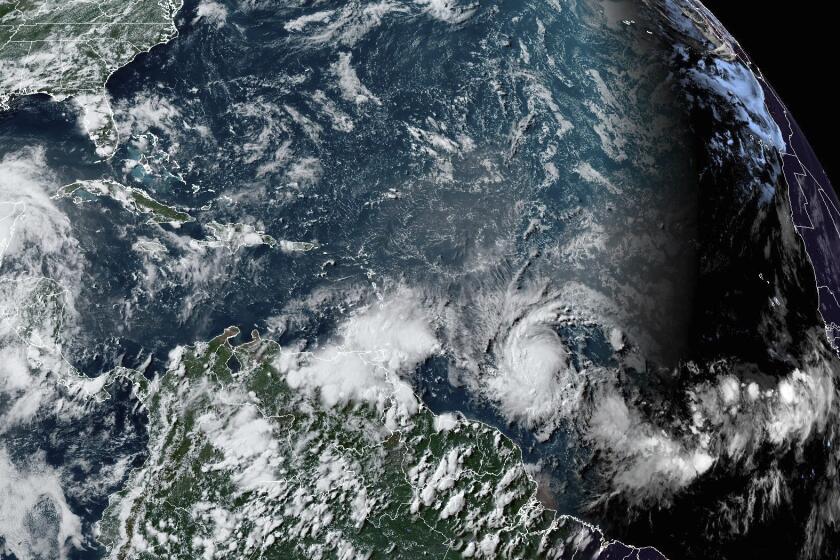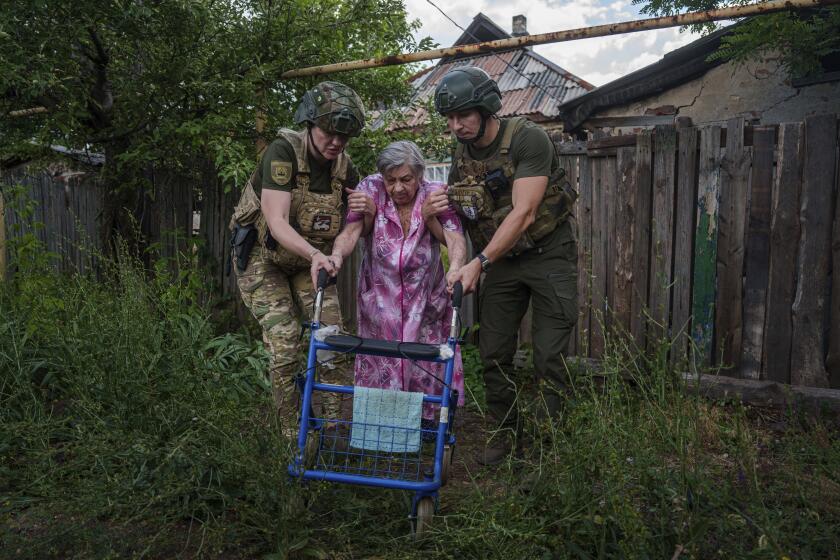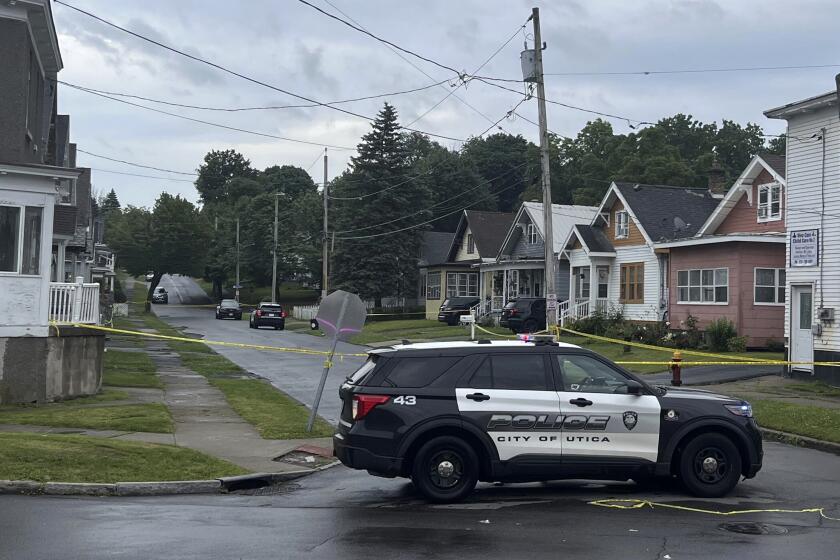Bush, Yeltsin Vow Friendship; ‘Enduring Peace’ Their Goal : Summit: They pledge that the United States and Russia will no longer regard each other as adversaries. Moscow leader warns of a ‘hot war’ if his reforms fail.
President Bush and Russian President Boris N. Yelstin, putting the Cold War formally to rest, proclaimed on Saturday a “new era” in which the two nations will join as allies to seek “an enduring peace that rests on lasting common values.”
In a joint declaration issued after a three-hour meeting at this rustic presidential retreat, they vowed that their countries will no longer regard each other as adversaries. Instead, they pledged to act as partners in promoting democracy and reform.
“Russia and the United States are starting a new relationship, and it’s based on trust,” Bush said at a joint press conference.
The proclamation of U.S.-Russian friendship comes at a time of mutual aspirations for a Russia transformed but also of shared concern about what would happen if the effort fails. Warning against the return of the old Communist regime, Yeltsin declared: “If the reform in Russia goes under . . . the Cold War is going to turn into a hot war.”
The declaration provided a symbolic centerpiece for a summit whose main purpose was giving a powerful American endorsement to Yeltsin, the once-scorned populist leader now regarded as indispensable to Russian reform.
And with small gestures and warm words, the two leaders portrayed themselves as having forged an important personal bond. By the end of their time together they were dressed in identical fur-lined Camp David parkas, striding side by side against a bitter winter wind.
“We say Boris and George,” Yeltsin announced at the news conference during which the two took turns proclaiming their admiration for the other, “and already this says a lot.”
“I have a very warm feeling in my heart about what he has done and is trying to do,” Bush said of the Russian leader, “and I consider him my friend.”
As they parted company, the two leaders said they regretted only that the visit was so short. But they announced plans to meet twice again this year for more formal summits in Russia and the United States, with Yeltsin to return to Washington as early as April.
The abbreviated session, coming a day after the two participated in the U.N. Security Council summit in New York, provided no time for detailed discussion of arms control proposals Bush and Yeltsin have put forward in recent days. But they reaffirmed their determination to seek radical reductions in their nuclear arsenals, and said Secretary of State James A. Baker III would visit Moscow within two weeks to begin a new round of talks.
In a first sign of White House interest in a Russian proposal that the nations cooperate on developing a global anti-missile shield, Bush also suggested that Russian nuclear scientists might be put to work on such a project as a way to guard against their being lured away by other nations with nuclear aspirations.
The meeting between Bush and Yeltsin was their first since the collapse of the Soviet Union and the resignation of Soviet President Mikhail S. Gorbachev elevated Russia to independence and its leader to international stature. Yeltsin later met with a group of congressional leaders in Washington before departing for Ottawa on his way home.
Administration officials had long pronounced themselves skeptical of Yeltsin and his credentials as a champion of reform. But they have been pleasantly surprised by the Russian leader’s steady commitment to both economic conversion and democracy.
And in the face of bleak assessments from U.S. analysts that any successor to Yeltsin would be hostile to U.S. interests, Bush and the senior advisers assembled at Camp David on Saturday made clear they had set their skepticism aside.
In what Administration officials described as a bid to add luster to an ill-polished Yeltsin image, Bush showered the Russian leader with public praise after a private visit that brought Yeltsin into the most exclusive of inner circles.
The President welcomed Yeltsin to his weekend retreat with a ride in a golf cart along a rocky path while the Bush family dogs chased behind. He presented the Russian leader with a cake and a pair of black-leather cowboy boots in honor of his 61st birthday. And when a reporter asked Bush later about their relationship, he reached out toward Yeltsin in a gesture of affection.
“He laid his life on the line on top of a tank . . . and the whole world rejoiced in it when they saw his courage,” Bush said in tribute to Yeltsin’s role in leading resistance to the August coup. “He’s applying that same courage now to this concept of economic reform. And one certainly cannot doubt his full commitment.”
Bush said that although the problems Yeltsin faces are “enormous,” he will overcome them “if he gets the proper support from around the world.”
Yeltsin also hewed an unusually gracious line, resisting an opportunity to repeat previous complaints voiced elsewhere about insufficient Western economic aid. “I didn’t come here just to stretch out my hand and ask for help,” he said.
But he warned that without the international help that he and Bush sought, the reforms he fought for might well “die on the vine,” making way for the return of “the same regime that we have just recently rid ourselves.”
As a specific commitment to action, the Camp David declaration agreed to by the two leaders did not mark a major departure in U.S.-Russian relations. But the starkness of its first principle--”that Russia and the United States do not regard each other as potential adversaries”--stood as an extraordinary emblem of the degree to which conflict has been replaced by cooperation.
Administration officials said Yeltsin had sought the declaration as a symbol of a slate wiped clean. With its signing, the Russian leader himself proclaimed, the two nations had “crossed out all the things that had been associated with the Cold War.”
In renewing his recent arms control proposal, Yeltsin indicated during the news conference that he is ready to eliminate as much as 90% of the former Soviet Union’s 27,000-weapons nuclear stockpile. Bush, who has put forth his own plan, said he is ready to negotiate but was noncommittal about the outcome.
“We saluted his very broad proposals,” Bush said. Administration officials privately expressed relief that Yeltsin’s proposals did not seek even deeper cuts, and they hailed as a welcome sign his declared commitment to maintain a nuclear deterrent even if it was not directed against the United States.
“There are still adventurers, terrorists and irresponsible politicians in some countries of the world against whom we have to (maintain) a certain arsenal of nuclear weapons for restraining them,” Yeltsin said when asked why he did not advocate complete disarmament.
The two leaders were dressed casually if differently before the cameras, Bush in a blue turtleneck and zipped-up presidential jacket, Yeltsin in an electric-blue Polo shirt and baggy V-neck sweater.
They appeared at ease with one another, and Yeltsin, in advising patience to those judging the performance of the new Commonwealth of Independent States, turned almost colloquial in warning against anyone who might expect too much.
“This is still a baby in diapers,” he said. “You’ve got to take care of it. You’ve got to handle it carefully, so you don’t drop it.”
Times staff writer Norman Kempster contributed to this article.
More to Read
Start your day right
Sign up for Essential California for news, features and recommendations from the L.A. Times and beyond in your inbox six days a week.
You may occasionally receive promotional content from the Los Angeles Times.






